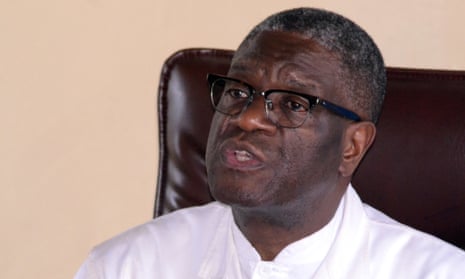The Congolese doctor named the joint winner of this year’s Nobel peace prize has called on the Congolese government to leave power, describing the polls scheduled for December as a “parody of an election”.
Dr Denis Mukwege, who was in surgery when he heard that he had won the prize for his treatment of 50,000 survivors of sexual violence, has been an outspoken critic of the president of the Democratic Republic of the Congo, Joseph Kabila, and his government. He told the Guardian he held them responsible for not protecting women in the country.
“The Congolese people live with unheard-of violence. Unheard of,” Mukwege said by phone from his hospital in Bukavu, in eastern DRC. “He [Kabila] is responsible for not putting an end to the violence. His role is to protect his people and their belongings. We see that 20 years after it came to power, this government does not protect women.”
Kabila refused to leave power when his mandate ended nearly two years ago and his anointed successor’s strongest competitor has been forbidden to run.
“I’ve always said that it’s an illegal and illegitimate government,” Mukwege said. “They must hand over to a caretaker government, which can organise free, fair, credible elections, and this transition must also put in place the foundations to build a solid democracy.
“I think we’ll have elections on 23 December, but I think we’ll elect the same people, and the same actors will produce the same system that perpetuates the violence. The December elections do not seem credible or transparent … it’s a parody of an election.”
On Friday, when he was awarded one of the world’s most prestigious prizes, Mukwege had arrived in his surgery at 7.30am as usual. He was operating on his second patient when he heard some of his patients and colleagues crying; this is how he learned he had won.
“When I got the news, I was on my second procedure. Unfortunately then, the hospital was invaded by women and my personnel and so regrettably I couldn’t continue my programme for the day,” he said.
Mukwege grew up the son of a pastor in the DRC’s South Kivu region. When he came back from training as an obstetrician in France, the first patient treated in the maternity clinic he founded was a rape survivor. As dozens more poured through his doors, he realised that rape was being used as a weapon of war.
Atrocity followed atrocity. A mass rape of at least 119 women in Songo Mboyo in 2003 unusually resulted in convictions and, in theory, damages, but the money was paid out to the wrong person and was never recovered. In 2012, hundreds of women and children were systematically raped in the town of Minova.
Beginning in 2013, Mukwege and his team had to care for dozens of girls from the town of Kavumu who were taken from their beds and raped by a militia led by a provincial member of parliament who believed raping children would protect them from their enemies. Eleven men including the MP, Frederike Batumike, were eventually convicted of crimes against humanity in a landmark trial.
Despite the efforts of Mukwege’s Panzi hospital and charity and others to treat the thousands of survivors, fight for justice and help them reintegrate in a society that stigmatises those who have been raped, the situation in the Kivus is getting worse.
“In 2016 we saw the number of armed groups grow. Unfortunately since the beginning of this year, we have been receiving calls about mass rapes,” Mukwege said. “It’s very sad. It’s a drastic situation for women and for the population in general.”
There were mass rapes in Kabikokole in February and Wameli in April. Panzi has treated 2,077 victims so far this year. Campaigners says sexual violence is rising steeply in other parts of the vast country too. Mass rapes have been reported in Kasai, where a conflict is raging that could be a harbinger to genocide, the UN has warned.
Mukwege and his family survived an attempted kidnapping and murder in 2012. He fled to the US, but returned after three months to continue his work. He would like to live in town, but has to stay in the hospital, watched over by UN peacekeepers, as the death threats keep coming.
“I haven’t dared to leave the hospital because of the threats,” he said. “As long as there’s no rule of law, as long as we have arbitrary rule, nobody can know who does what and for whom.”
Having been shortlisted for the peace prize for a decade, he was jointly awarded it on Friday with Nadia Murad Basee, an Iraqi campaigner who survived sexual slavery at the hands of Isis jihadists and who has fought for the plight of Yazidi women to be recognised.
He said that the worth of the prize would be measured by its power to transform the lives of the women he served. “All its importance will be in its capacity to change the situation of victims in conflict zones,” he said.
